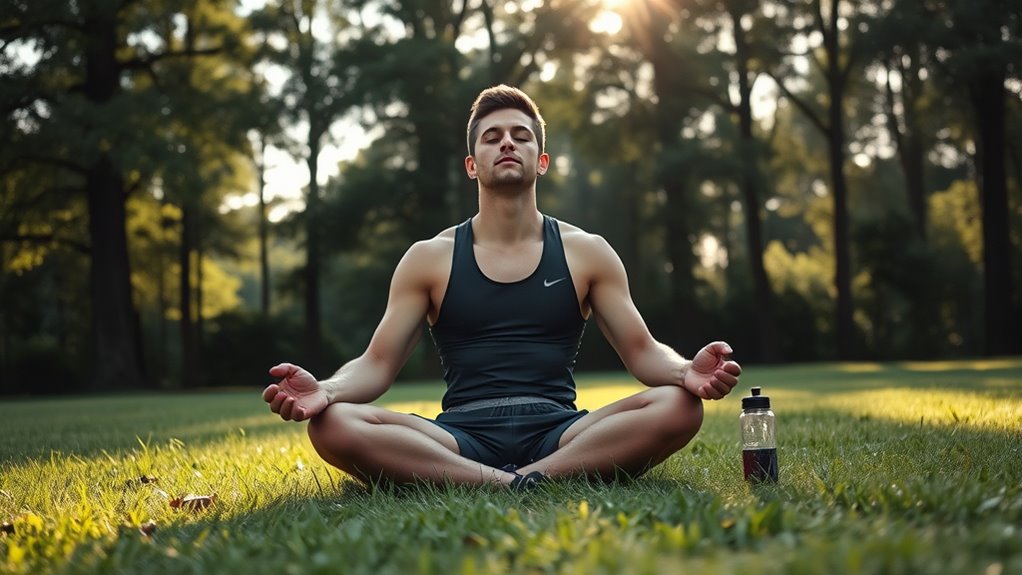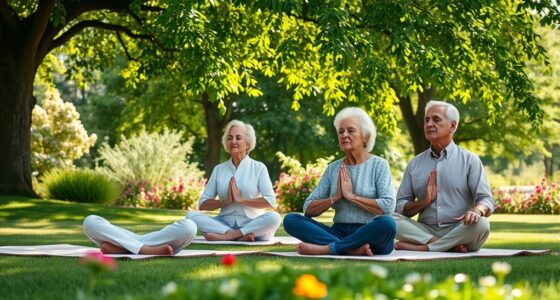Practicing meditation can give you a mental edge by boosting your focus, resilience, and stress management. It helps you stay present and composed during high-pressure moments, sharpening your mental clarity for precise skills. Regular meditation also strengthens emotional regulation and mental toughness, which translate into better performance and consistency. Incorporating simple mindfulness techniques into your routine requires only a few minutes and a quiet space. Keep exploring to discover how these practices can elevate your athletic potential.
Key Takeaways
- Meditation enhances focus, concentration, and mental clarity, helping athletes stay present during training and competitions.
- Regular meditation reduces stress and cortisol levels, promoting relaxation and quicker recovery from setbacks.
- It improves emotional regulation and mental resilience, enabling athletes to maintain composure in high-pressure situations.
- Meditation practices are simple to start, requiring only a quiet space and a few minutes daily, making them accessible for athletes.
- Incorporating meditation into training builds long-term mental toughness, supporting consistent performance and overall athletic success.

Many athletes are turning to meditation to enhance their performance and maintain mental clarity. One of the most effective ways to do this is by practicing mindfulness techniques, which help you stay present and fully engaged during your training and competitions. By focusing on your breath, bodily sensations, or the task at hand, you can tune out distractions and improve your concentration. This mental clarity isn’t just about feeling calm; it’s about sharpening your focus so you can execute your skills with precision when it matters most. Incorporating mindfulness techniques into your routine can create a mental edge, helping you stay centered amid the chaos of competition or intense training sessions.
Practicing mindfulness helps athletes stay present, sharpen focus, and perform with precision during training and competitions.
Stress reduction is another major benefit of meditation for athletes. When you’re under pressure, your body responds with increased heart rate, muscle tension, and heightened adrenaline—all of which can impair your performance. Meditation offers a powerful tool to counteract these effects. Regular practice helps you regulate your stress response, lowering cortisol levels and promoting relaxation. This calming effect not only makes you feel better mentally but also physically prepares your body for peak performance. When you learn to manage stress effectively, you’re less likely to experience burnout or injury, and you can recover more quickly from setbacks. Over time, meditation becomes a cornerstone of your mental resilience, allowing you to approach challenges with a clear, focused mindset rather than anxiety or frustration.
Getting started with mindfulness techniques for stress reduction is simple. You don’t need any special equipment—just a quiet space and a few minutes. Begin by sitting comfortably, closing your eyes if you like, and taking slow, deep breaths. Focus your attention on your breath entering and leaving your body. When your mind wanders—which it will—gently redirect it back to your breath without judgment. This practice trains your mind to stay present and aware, which can be particularly helpful during high-pressure moments in your sport. Over time, you’ll notice your ability to stay calm under pressure improves, and your reactions become more deliberate rather than impulsive. These mental skills translate directly into better performance, especially in situations where mental toughness is key.
Incorporating mindfulness techniques into your training routine isn’t about replacing physical practice; it’s about complementing it. As your mental resilience grows, so does your capacity to handle the demands of your sport. The combination of physical skill and mental clarity will give you an advantage, helping you perform at your best when it counts. Meditation and stress reduction through mindfulness aren’t just temporary fixes—they’re lifelong tools that can make you a stronger, more focused athlete.
Frequently Asked Questions
How Quickly Can Athletes See Results From Meditation?
You can start noticing mental benefits from meditation within a few days, but consistent practice is key. With regular mindfulness sessions, athletes often see improvements in focus, stress management, and resilience in just two to four weeks. Staying consistent enhances these effects over time, helping you perform better and stay calm under pressure. Remember, patience and dedication are essential to *accessing* the full benefits of meditation for athletic success.
Is Meditation Suitable for All Sports Disciplines?
Yes, meditation benefits all sports disciplines by enhancing focus, reducing stress, and improving overall sports performance. Whether you’re in individual or team sports, meditation can help you stay calm under pressure and sharpen your mental clarity. You can easily adapt meditation techniques to your specific sport, making it a versatile tool to boost your mental resilience and maximize your athletic potential across any discipline.
Can Meditation Replace Physical Training Routines?
You can’t replace physical training routines with meditation because physical skill development is essential, but meditation enhances your overall performance. Studies show that athletes practicing meditation experience a 20% reduction in stress levels, strengthening the mind-body connection. By incorporating meditation into your routine, you improve focus and stress management, complementing your physical efforts. It’s a powerful tool, but it works best alongside, not instead of, your regular training.
What Are Common Challenges Athletes Face When Starting Meditation?
You might find it challenging to stay consistent with mindfulness practices initially, as your mind tends to wander or resist slowing down. Stress management can feel overwhelming when you’re new to meditation, making it hard to focus. You may also struggle with patience, expecting quick results. Remember, persistence is key. Over time, these challenges diminish, and meditation becomes a helpful tool for enhancing mental resilience and overall athletic performance.
Are There Specific Meditation Techniques for Competitive Anxiety?
Think of your mind as a tense bowstring before a big game. To ease that tension, use breathing exercises to calm your nerves and visualization techniques to picture success. These specific meditation methods help reduce competitive anxiety by anchoring you in the present moment. Regular practice builds mental resilience, so when the pressure rises, you stay focused and composed, just like a perfectly drawn bow ready to release its arrow.
Conclusion
By embracing meditation, you boost your brain, banish barriers, and build a bold, balanced body. Consistent calm cultivates confidence, clarity, and concentration, creating a competitive edge. So, start small, stay steady, and see your skills soar. Remember, mental mastery makes a mighty difference—meditate to motivate, motivate to move forward. With focus and faith, you’ll find your fitness flourishing, fueling your future triumphs. Meditate today, master tomorrow!









